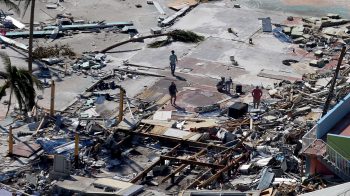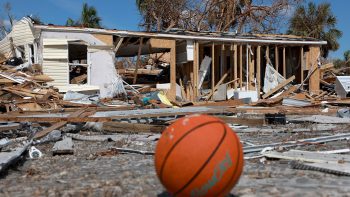Florida beginning to insure itself
TEXT OF STORY
Kai Ryssdal: The mayor of New Orleans, Ray Nagin, was in Washington today. There was a hearing in the House on health care in the wake of Hurricane Katrina, almost two years ago now.
Florida took a hit from that storm as well. By the time Katrina hit, Florida was in the middle of the most intense series of hurricanes ever — eight of them in 15 months.
And Private insurers backed away from the Florida market. So the state created a government-backed insurance company of last resort called Citizens. From Miami, Dan Grech reports.
Dan Grech: Florida once relied on companies such as Allstate and State Farm to cover hurricane risk. Citizens was there as a backstop. Then Hurricane Charley hit. And Frances, Ivan and Jeanne, Dennis, Katrina, Rita and finally, Wilma.
Private insurers ran for the hills, and Citizens suddenly found itself with 1.3 million policies — one-third of the total. In other words, Florida’s moving rapidly toward insuring itself.
Scott Wallace is Citizens’ CEO:
Scott Wallace: I really don’t think that the state of Florida had any other choice. Mother Nature created this situation and we had to respond.
Meteorologists say we’ve entered a decades-long period of increased hurricane activity. And Florida, surrounded on three sides by warm water, is like a giant “kick-me” sign.
Bruce Douglas is Chairman of Citizens’ Board of Governors. He says if Citizens were a traditional insurance company, it would have increased premiums this year by a whopping 85 percent.
Bruce Douglas: And the rate increases got to the point where somebody had to blow a whistle and say, “The public can’t handle this right now.”
So earlier this year, the Florida legislature froze Citizens’s premiums until 2009. Now, the state-backed firm’s adding 25,000 new policies a week. By year’s end, nearly half of the state’s homes will be covered by Citizens.
Robert Hartwig: This is a great experiment in socialized property/casualty insurance that we’re seeing in Florida today.
Robert Hartwig is spokesman for the Insurance Information Institute, an industry trade group.
Hartwig: Florida overnight became one of the largest reinsurers in the world. And your average Florida homeowner is unaware that whether they like it or not, they are going to be obliged to pick up the financial pieces if and when a major storm occurs.
Since the legislature froze its premiums, Citizens may not be able to pay all the claims after a big one hits. So lawmakers have given the firm an extraordinary power: the ability to pay for a storm after it hits, through special assessments. If Citizens were to run out of money, every Floridian with property insurance would be forced to pitch in — possibly for decades.
William Stander is with the Property Casualty Insurers Association of America.He says this may be the biggest roll of the dice in hurricane insurance history.
William Stander: If you’re not allowing private companies to charge what they need to charge, and you throw that policy of insurance to the state, you are just encouraging the dramatic expansion of your potential liability. And then ultimately the bill comes due, and we all pay.
But many homeowners said they were already paying out the nose through soaring premiums. They told their elected officials they would be priced out of their homes unless rates were slashed.
Jack Seiler: There are a number of Floridians that would have been homeless this year, and I think would have been facing foreclosure and trying to refinance.
State Representative Jack Seiler helped write the new insurance legislation.
Seiler: I think we averted a major disaster in the state of Florida.
Board Chairman Douglas says Citizens has $9 billion in hand, enough to cover all but the strongest storm.
Douglas: It will take a category 5 hitting the densest area that we insure . . . then it’s beyond any individual state’s capacity to handle it. We’d have to reach out for help.
Floridians are hoping that help won’t be necessary. But with August and September often the busiest months of the hurricane season, no one here is sleeping easy.
In Miami, I’m Dan Grech for Marketplace.
There’s a lot happening in the world. Through it all, Marketplace is here for you.
You rely on Marketplace to break down the world’s events and tell you how it affects you in a fact-based, approachable way. We rely on your financial support to keep making that possible.
Your donation today powers the independent journalism that you rely on. For just $5/month, you can help sustain Marketplace so we can keep reporting on the things that matter to you.


















